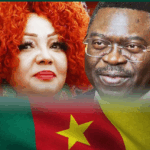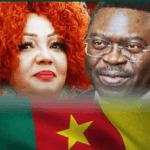
Even as Cameroonians voted yesterday, 12 October 2025, the political landscape in the country remains dominated not by traditional electoral politics by the intense, internal succession contestsurrounding the tenure of President Paul Biya, who has been in power since 1982. The election is widely viewed as a mechanism to legitimise an eventual successor to Paul Biya, who would be chosen through internal alignment.
This dynamic means that those holding strategic positions of power and access, like First Lady Chantal Biya and the powerful administrative “gatekeeper,” Ferdinand Ngoh Ngoh, are far more critical than declared political candidates. The country’s political future is thus a high stakes, behind-the-scenes battle pitting the bureaucratic institutions against the powerful networks of family influence.
The First Lady, Chantal Biya, holds immense soft power and is pivotal in post Biya planning. While she holds no formal constitutional office, her influence is derived from her direct, unmediated access to the President, effectively making her the ultimate gatekeeper to the head of state.
She leverages this position to cultivate a powerful network of loyalists and allies within the government, the ruling party (CPDM), and the business community. Her primary political role is often seen as preserving the interests and security of the “Biya clan” and ensuring that any succession scenario protects their legacy and assets. She represents the personal, family based power faction, contrasting with those whose authority is primarily bureaucratic.
On the other side of this high-level political chessboard is Ferdinand Ngoh Ngoh, Minister of State and Secretary General at the Presidency (SGPR), who was officially granted permanent delegation of signature by presidential decree on February 5th 2019, effectively giving him presidential powers over key decisions. This position is arguably the most powerful administrative post in the country, often referred to as the de facto Prime Minister or the administrative engine of the state.
The SGPR manages the flow of information, controls bureaucratic appointments, oversees high-level contracts, and directs the operational execution of presidential decrees. Ngoh Ngoh’s power is thus institutional and operational. His ability to manipulate the bureaucratic machinery and influence key decisions makes him a leading kingmaker— or potentially a successor candidate himself— in the impending political transition. These two figures, one wielding influence through proximity and the other through procedure, encapsulate the fundamental rift within the Biya establishment.
The political interaction between Chantal Biya and Ferdinand Ngoh Ngoh is best characterised as a cohort marked by latent rivalry. While both figures are central to the current Biya establishment and may align strategically against perceived external threats or other powerful institutional figures, their interests fundamentally diverge regarding ultimate control.
Ngoh Ngoh’s bureaucratic dominance contrasts with the First Lady’s leveraging of personal and familial ties. Their dynamic is one of constant, subtle manoeuvring: they must cooperate to keep the Sérail functioning and to manage the transition process, but they are simultaneously rivals competing to place their respective loyalists in critical positions that will determine the balance of power in the post-Biya era. This internal tension is the core driver of Cameroon’s current political climate as it barrels toward the next electoral contest.
Cameroon’s Power Alliance: A nation’s fate in the hands of two rival factions
Cameroon is a country at a crossroads, where the transition of power is not a democratic process but a complex and precarious negotiation between a family-based inner circle and a powerful state bureaucrat, with the military, business interests, and party loyalists all jockeying for position on this dangerous chessboard. The formal opposition, for now, remains outside the gates, watching the real game unfold from a distance.

Cameroon’s power dynamics
The supporting cast and the strategic chessboard
The remaining groups on the political map are either key prizes, strategic pawns, or potential threats in this ongoing power struggle: The business elite and financial control: The close intertwining of business and state interests is represented by the likes of Finance Minister Louis Paul Motaze and the jailed media mogul Jean-Pierre Amougou Belinga. Motaze, in his official capacity, holds significant power through his mandate to elaborate and implement the government’s financial, budgetary, fiscal, and monetary policy, exemplified by his focus on tax incentives and guarantee funds to support national enterprises.
His influence, however, may be waning, with rumours suggesting he and Communication Minister René Emmanuel Sadi are facing sidelining by Ngoh Ngoh’s faction.
The dramatic imprisonment of Amougou Belinga—arrested in 2023 and charged in connection with the torture and assassination of journalist Martinez Zogo—is a clear, factional signal of the battle lines being drawn against the business elite. Belinga himself had previously utilised his media empire, which includes the newspaper L’Anecdote and the television channel Vision 4, as a political tool, even publishing a controversial list of presumed homosexuals in 2006, leading to a defamation conviction.
Loyalist gatekeepers: The old guard of the ruling CPDM party, such as Jacques Fame Ndongo and Paul Atanga Nji, serve as the regime’s public face and internal “sheriffs.” As Minister of State for Higher Education, Fame Ndongo wields control over the university system, a critical domain for intellectual and political influence.
Paul Atanga Nji, the Minister of Territorial Administration, has demonstrated his function as a staunch loyalist and enforcer through actions such as banning media discussion of the President’s health amid rumours of illness. The alleged promise of the Prime Minister role to Atanga Nji suggests that rewarding these key loyalists is a strategic necessity to secure their backing during the impending transition.
The security sector: The military elite remains the ultimate determinant of power. Figures like Defence Minister Joseph Beti Assomo and the Israeli commander of the Rapid Intervention Battalion (BIR), Eran Moas, are tasked with guaranteeing “stability and regime defence.” Assomo, as Minister Delegate at the Presidency in charge of Defence, is responsible for elaborating and implementing national defence policy and coordinating the forces of law and order.
The allegiance of this sector will be the final, decisive factor in any succession crisis. The marginalised opposition: Our research starkly reveals the opposition’s irrelevance in this power game. Maurice Kamto is shown to be “marginalised and excluded,” while the former insider, Issa Tchiroma Bakary, has defected.
Our interviews confirm that the real struggle for Cameroon’s future is taking place not through democratic elections, but within the ruling establishment itself, with the formal opposition watching the true political manoeuvring from the periphery. The overarching story is the visible drive by Ferdinand Ngoh Ngoh to actively consolidate power in preparation for succession.
This involves bolstering his bureaucratic network while simultaneously purging or sidelining rivals within the governmental structure (such as Lejeune Mbella Mbella) and among the business elite (Motaze, Sadi, Belinga). This manoeuvre is being executed within a precarious system where the First Lady’s clan remains a formidable, parallel power that Ngoh Ngoh must either seek to cooperate with or eventually confront.
In essence, this political map depicts a country at a critical juncture. The handover of power is less a democratic exercise and more a complex, delicate negotiation between a powerful, family-based inner circle and the state’s powerful chief bureaucrat, with the military, business interests, and party loyalists all competing for position on this dangerous political chessboard.
Other matters
Institutional resilience against succession shock Outside the political and military elites, the specific institutional or bureaucratic mechanisms being strengthened to withstand the shock of a sudden post-Biya struggle remain nascent and largely reactive. Mid level technocrats and civil service directorates are pushing incremental reforms in areas like e-governance adoption (to reduce paper-based corruption) and public finance management (through bodies like the Supreme State Audit/CONSUP), but these efforts are severely constrained by the highly centralised, personalised nature of the presidency.
While some attempts at judicial reform have been initiated under international pressure, the system remains deeply politicised, meaning no institutional mechanism currently possesses the necessary independence, transparency, or constitutional mandate to effectively act as a stabilising anchor against rapid institutional decay during a succession crisis. Consequently, in the event of a sudden succession, the state lacks the robust institutional shock absorbers necessary to prevent a rapid descent into factional violence and political chaos, making the current behind-the-scenes manoeuvring all the more critical.
The future of Ambazonia
The Anglophone crisis, often simplified as a separatist movement, has entered a military stalemate marked by high civilian/military casualties and persistent internal displacement, but currently lacks the political momentum for a decisive end. The future of Ambazonia hinges on a profound political fissure: the highly factionalised separatist leadership in the diaspora (often split between hardline and federalist wings) has failed to present a unified diplomatic front or command unified authority over the fragmented, decentralised armed groups (Amba Boys) on the ground.
For the regime in Yaoundé, the conflict has been an unexpected political utility, serving as a powerful pretext for security sector consolidation and a distraction that justifies a massive military budget, thus making a negotiated resolution less urgent for the ruling elite than managing the internal succession. Rather than seeking its resolution, this calculated management of the conflict underscores how the internal succession struggle takes precedence over all other national issues for the Yaoundé elite.
The Boko Haram insurgency in Cameroon
The prioritisation of the Anglophone crisis, driven by domestic political calculations, has had a direct and negative impact on national security in the Far North. The sustained, high-intensity operational strain on the Cameroonian military and security budget caused by the Anglophone conflict has demonstrably complicated counter-terrorism efforts in the Far North.
The constant deployment of elite units like the Rapid Intervention Battalion (BIR) to the Anglophone regions has thinned troop concentration and counter-intelligence capacity along the northern border, inadvertently creating opportunistic operational space for the Boko Haram insurgency.
This has allowed the insurgency to adopt more permanent, non-seasonal operational templates—shifting tactics from reliance solely on wet-season raids to establishing more persistent logistical and ideological footholds among vulnerable communities, which deepens the complexity of the long-term security threat. Future African Tactical emulation elections: The strategy employed by Cameroon’s ruling CPDM party is increasingly being viewed as a blueprint for what analysts term a “constitutional coup.” This sophisticated approach to “legalised authoritarianism” is being actively studied and emulated by entrenched regimes across Francophone Africa facing similar transition challenges.
This tactic relies on leveraging complete control over judicial and electoral bodies, such as the Constitutional Council and the electoral commission (ELECAM), to create legally sound, politically decisive obstacles for the opposition. The CPDM has used this to great effect, for instance, by legally marginalising the opposition (such as Maurice Kamto’s party boycotting past local elections, thereby losing legal standing and representation) and managing constitutional term extensions. This provides a clear roadmap for incumbents, particularly in places like Equatorial Guinea, Chad and formerly Gabon and Togo, to neutralise credible threats to power while maintaining a veneer of democratic process.
Regional spillover and stability
If the succession crisis triggers widespread violence, leading to a mass exodus of elite and capital, the resulting influx of hundreds of thousands of Cameroonian refugees and displaced persons would significantly alter the existing ethnic, economic, and political balance in key neighbouring states.
In Nigeria (particularly Cross River and Benue States), the influx would exacerbate existing resource competition in host communities. In Gabon and Equatorial Guinea, where ethnic ties often cross the border (e.g., the Fang/Beti groups), a refugee crisis could potentially destabilise political patronage networks, strain infrastructure, and spark xenophobic incidents, thereby creating new regional political unrest that demands multinational intervention or humanitarian support.
Such a multinational intervention would likely manifest as an African Union (AU) or Economic Community of Central African States (ECCAS) stabilisation force deployed to border areas to secure transit routes, coupled with a robust, internationally-funded logistical operation led by the UN to manage the massive influx of displaced persons and prevent further regional destabilisation.
Geopolitical implications
The succession uncertainty carries significant geopolitical implications, forcing foreign powers to rapidly choose sides or ensure the security of their long-term economic interests. This is particularly relevant for China, which is heavily invested in Cameroonian infrastructure and resource extraction, often tied to debt trap diplomacy. Other global actors are similarly focused on protecting their strategic investments and regional influence during the transition.
The technological battleground
The coming struggle will also be fiercely fought in cyberspace. The state apparatus utilises sophisticated surveillance and social media monitoring tools (often sourced internationally) to track activists and preempt protests before they can gain traction.
In response, the opposition and diaspora increasingly rely on decentralised, encrypted communication channels and digital disinformation campaigns to challenge the state’s official narrative and mobilise support, making the control of information a key battleground in the succession contest.
Conclusion: The evolving political desire and opposition challenge
Despite the entrenched elite power struggle detailed above, the dominant sentiment across Cameroon is one of eagerness for genuine political change. This national desire persists despite the systemic marginalisation of the opposition, exemplified by the continued unconstitutional exclusion of Maurice Kamto and his party from meaningful electoral participation.
President Biya’s political standing is clearly weakening, particularly as he is losing favour in the historically supportive North and amongst citizens overall due to decades of economic stagnation and centralised control. This vacuum is being challenged by figures like Issa Tchiroma Bakary of the Front for the National Salvation of Cameroon, the longtime former Minister of Communication and presidential spokesperson who, following his resignation from government in June 2025 after years as a prominent Biya loyalist and government mouthpiece, has now joined the opposition, a move that has rallied significant momentum.
However, the long-term prospects for a successful democratic transition remain clouded by a growing fear of a lack of a unified opposition coalition, an enduring weakness that the ruling party continually exploits to maintain its grip on power. This fragmentation suggests that while the people are ready for change, the opposition may not be structurally ready to deliver it.
The great paradox of Cameroon’s political future is therefore this: while the people are ready for change, the opposition remains structurally unable to deliver it, leaving the door open for a post-Biya era determined not by the ballot box, but by the backroom deals of the current elite.
About SBM Intelligence
SBM Intelligence is an Africa-focused geopolitical research and strategic communications
consulting firm that addresses the critical need for political, social, economic, and
market data and big data analytics. We employ various data collection methods. Our
Data Collection Methodology team advises on data collection methods for all ONS social
and business surveys. With clients in the business and wider government communities,
we aim to provide expert advice on data collection procedures and conduct research to
improve survey quality.
Since 2013, we have provided data analytics and strategic communication solutions to
clients across various sectors in Nigeria, Ghana, the Ivory Coast, Kenya, South Africa, the
United Kingdom, France and the United States.
- President Commissions 36.5 Million Dollars Hospital In The Tain District
- You Will Not Go Free For Killing An Hard Working MP – Akufo-Addo To MP’s Killer
- I Will Lead You To Victory – Ato Forson Assures NDC Supporters
Visit Our Social Media for More




